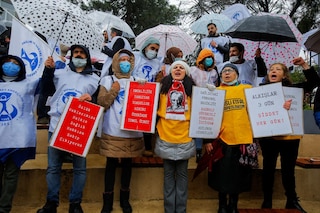Voices of discontent spread in Turkey as energy prices surge
Reuters
Turkey’s Alevi religious minority decided not to pay power bills for the cemevis where they worship.
Shopkeepers, city councils and a religious community group spoke out over surging energy bills in Turkey on Tuesday, while doctors held a one-day strike over working conditions as a wave of inflation-fuelled discontent spread across the country.
Inflation leaped to near 50% in January, raising the cost of living for Turks already struggling to make ends meet after a currency crash in December sparked by President Tayyip Erdogan’s unorthodox low interest rates policy.
The government has raised the minimum wage by 50% this year in response to the turmoil. But it also hiked prices for gas, power, petrol and road tolls to account for import price volatility, straining household budgets and deepening poverty.
Turkey’s Alevi religious minority decided not to pay power bills for the cemevis where they worship.
“Come and cut off our electricity. Our cemevis are not business premises, they are our places of worship,” Alevi federation head Celal Firat said on Twitter, where he posted a 30,000 lira ($2,200) power bill owed by his Alevi association.
Some restaurant owners posted notices on windows showing ballooning electricity bills, social media posts showed. Oguz Kaan Salici, deputy leader of the main opposition CHP party, said some households’ power bills were as high as their rent.
“People don’t know what to do, at home or at work. Citizens can no longer cope. Withdraw the price hikes immediately!” he wrote on Twitter.
Strains on Cities
The record currency depreciation and soaring prices have hit Erdogan’s opinion poll ratings ahead of elections set for no later than June 2023. The government says credit, exports and investment will help the country weather inflation.
Presidential spokesman Ibrahim Kalin said a new measure regarding power bills would be announced “very soon”, telling broadcaster A Haber on Monday: “We will not let our citizens be crushed by inflation.”
Mayors from 11 cities, including Istanbul’s Ekrem Imamoglu, sought central government action to ease the “unbearable” burden of energy price hikes. “The significant cost rises are now making it difficult for local administrations to provide services,” they said in a joint statement.
Their demands included a VAT and special consumption tax exemption for fuel used by municipalities, and lower tariffs for public transport power and natural gas usage.
Health Workers Strike
Doctors and medical staff held a nationwide one-day strike to protest at poor working conditions and to seek better rights and better service provision.
Health workers also complained about deteriorating living standards, and said they face a more hostile working environment amid the Omicron COVID-19 spike and patient discontent.
“We can’t get by. Our wages have been seriously eroded, of course like everyone else, but we are trying to carry out our profession in a very risky environment,” said Deniz Devrim, 46, a family doctor at an Istanbul protest by some 100 health workers.
Dozens of health workers were also on strike outside an Ankara hospital.
“We will continue to fight until we have secured our rights,” said Volkan Tumer, a member of a young doctors’ commission, complaining about extremely long work hours, poor pay and limited personal rights.
($1 = 13.6293 liras)



